Walking Through the Fire
Indigenous Collaborations with Sultans of String & Friends


Teacher’s Notes

Hello, we are Sultans of String! We are now embarking on the most ambitious and important project of our career, recording our ninth album and live show called Walking Through the Fire, a powerful collection of collaborations with First Nations, Métis, and Inuit artists across Turtle Island.
We want to make a difference in the world with the music we play, so we’re making this album in the spirit of the Truth and Reconciliation Commission’s 94 Calls to Action, and Final Report that asks for Indigenous and non-Indigenous people to work together as an opportunity to show a path forward.
We know that as a society we can’t move ahead without acknowledging and reflecting on the past. Before reconciliation can occur, the full truth of the Indigenous experience in this country needs to be told, so we’ve been calling on Indigenous artists to share with us their stories, their experience, and their lives, so we settler Canadians can continue our learning about the history of residential schools, of genocide, and of intergenerational impacts of colonization.
One of our collaborators, Chippewa/Anishinaabe Elder and poet Dr. Duke Redbird, was involved in our last project, "Refuge/Sanctuary”. In fact, it was Duke who said to bandleader/producer Chris McKhool “When are you going to do for awareness of Indigenous people what you did for refugees to Canada?” that propelled this project into being. It was an honest question and a call to action.
We know that this is a challenging project to do properly and that it needs a lot of consultation, so we have been consulting with Indigenous artists including Duke Redbird, along with Ts’msyen artist Shannon Thunderbird, Conlin DelbaereSawchuk of the Métis Fiddler Quartet, Ojibwe singer-songwriter Marc Meriläinen, Indigenous art director Mark Rutledge, and Indigenous filmmakers and videographers Eliza Knockwood and Marc Meriläinen in addition to our regular team.
This project involves a lot of sensitivities, and requires a lot of research, and constant input from many Indigenous collaborators. As settlers, we understand the great responsibility involved in collaborating with Indigenous artists, and we do not take the creation of this project lightly. Duke says:
"The place that we have to start is with truth. Reconciliation will come sometime way in the future, perhaps, but right now, truth is where we need to begin the journey with each other.
We also met with the Honourable Murray Sinclair, former chair of the Truth & Reconciliation Commission, to speak about the project, who reflected;
"The very fact that you're doing this tells me that you believe in the validity of our language, you believe in the validity of our art and our music and that you want to help to bring it out. And that's really what's important, is for people to have faith that we can do this... That's really good”
Many of our collaborators have spoken about the importance of using Indigenous languages, so these do not become lost. Therefore, our song with Leela Gilday is sung in Dene. In the song Quviasuliqpunga we feature Kendra Tagoona and Tracy Sarazin singing in Inuktitut. The Black Winged Raven song with Shannon Thunderbird includes Sm'algyax. And in our first single we released with Northern Cree called Nîmihito (Dance), they share their lyrics in Cree.
We are excited for the opportunity to be presenting "Walking Through the Fire" live with our collaborators. The concert lineup consists of the core Sultans of String members (Chris McKhool on violin, Kevin Laliberté on guitar and Drew Birston on bass), as well as Indigenous artists Marc Meriläinen (Nadjiwan), Alyssa Delbaere-Sawchuk of the Métis Fiddler Quartet, and Coast Tsm’syen artist Shannon Thunderbird. We also have incredible multimedia technology to bring in virtual guests on the big screen, including Duke Redbird, the Northern Cree Pow Wow group, and Inuit singers Kendra Tagoona and Tracy Sarazin.
Who is on the Walking Through the Fire?
Here is the track listing of our full recording. You can hear the songs we have released so far at this Spotify link: https://tinyurl.com/sos-spotify
1. A Beautiful Darkness (3:36) feat. Marc Meriläinen / Nadjiwan (Ojibwe)
2. The Rez (4:10) feat. Crystal Shawanda (Ojibwe Potawatomi)
3. Take Off the Crown (3:53) feat. Raven Kanatakta of Digging Roots (Anishinabe Algonquin / Onkwehón:we Mohawk)
4. Ko (3:59) feat. Leela Gilday & Leanne Taneton (Dene)
5. Nîmihito (Dance) (4:24) feat. Northern Cree (Cree)
6. Lost and Found (4:16) feat. Shannon Thunderbird & Kate Dickson (Ts'msyen)
7. Black Winged Raven (2:44) feat. Shannon Thunderbird (Ts'msyen)
8. Our Mother The Earth (3:15) feat. Dr. Duke Redbird (Chippewa/Anishinaabe)
9. Sweet Alberta (3:01) feat. The North Sound (w/ Forrest Eaglespeaker -Blackfoot)
10. Humma (2:05) feat. Kendra Tagoona & Tracy Sarazin (Inuit)
11. Highway of Tears (4:23) feat. Don Ross (Mi'kmaw) & M.J. Dandeneau (Métis)
12. Chanson de Riel (3:43) feat. Métis Fiddler Quartet (Métis)
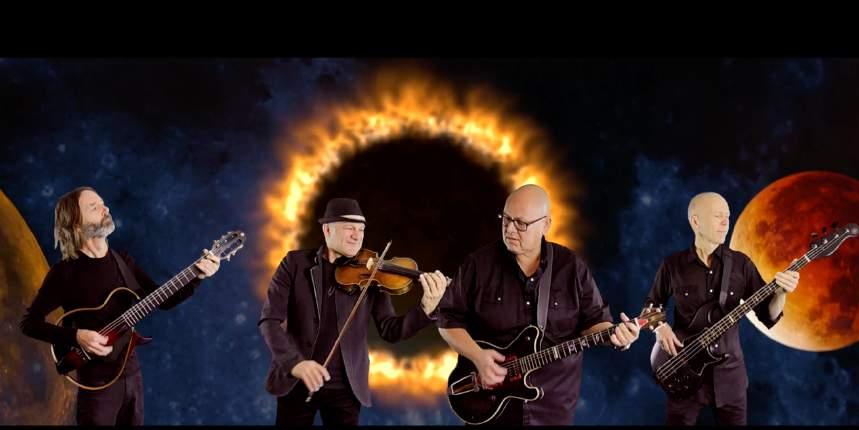
13. Tkaronto Reel (2:49) feat. Métis Fiddler Quartet (Métis)
14. Quviasuliqpunga (2:16) feat. Kendra Tagoona & Tracy Sarazin (Inuit)
And Sultans of String band regulars Chris McKhool (violin), Kevin Laliberté (guitar), Drew Birston (bass) and Rosendo 'Chendy' Leon (drums and percussion).
"We are opening doors for each other, as Indigenous peoples, as settler peoples. This project is about creating more connections through being a conduit, and creating more spaces to learn from each other."
- Alyssa Delbaere-Sawchuk, Métis Fiddler Quartet violist
Sultans of String has read the Statement on Indigenous Musical Sovereignty, and we are very sensitive to ensure that the Indigenous creators we are working with are granted authority and full oversight on how their Indigenous communities are portrayed. 100% of the lyrics in the recording and live show are written by the Indigenous artists, and all arranging and composition is done with tremendous respect for collaborating artists, who sign off on the songs at several stages.
Alyssa Delbaere-Sawchuk
https://www.alyssakatrine.com
Born in Treaty One of Ukrainian and Red River Métis roots tracing back to Louis Riel’s ancestors, Alyssa Delbaere-Sawchuk has a DMus in classical and fiddle music traditions from the Université de Montréal. Her Métis family names are Nault and Recette. She mentored with Ojibwe elder fiddler Lawrence “Teddy Boy” Houle and collaborated with James Flett to create the award winning Oméigwessi, Reel Métis: A Tribute to Walter Flett.
Alyssa is also a member of Métis Fiddler Quartet, winner of the 2012 Canadian Folk Music Award for Best Traditional Album. Alyssa is the artistic producer and violinist for Kuné: Canada's Global Orchestra, an ensemble that brings the diverse sounds of Toronto into one musical family.
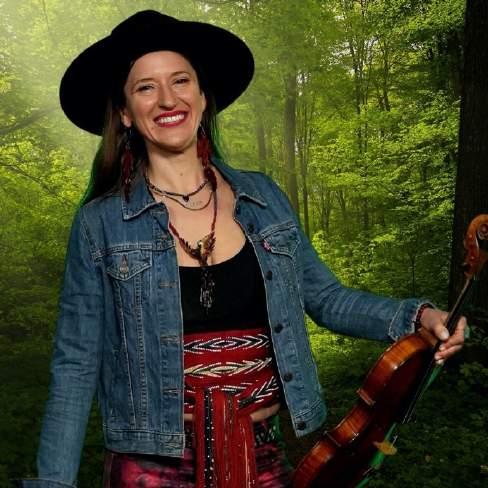
SONG: Tkaronto Reel
Tkaronto Reel by Nicholas Delbaere-Sawchuck, Arr. by Métis
Fiddler Quartet and Chris McKhool
Métis fiddle is a style marked by the percussive use of the bow and percussive accompaniment (such as spoon percussion). The Metis people are a poly-ethnic postcontact Indigenous peoples. Fiddles were introduced in this area by Scottish and French-Canadian fur traders in the early 1800s, where the Metis community adopted the instrument into their culture.
The Métis fiddle tradition is an oral tradition, and it is notable that the meter can vary from measure to measure and is very percussive. Players use their feet and choke up on the bow to enable a very sharp "bite".
Conlin Delbaere-Sawchuk
https://www.facebook.com/metisfiddlerquartet
Conlin is Métis originating from the Red River settlement region. He is a professional folk and classical musician with a Bachelors of classical singing performance from the University of Ottawa. Conlin has a JD from the University of Toronto Faculty of Law and is a practicing member of the Ontario Bar.
Conlin draws artistic inspiration from his passion for music and his Métis heritage: fusing Métis folk traditions with an eclectic mix of musical genres and styles. He is renowned for his evocative delivery of classical, folk and original songs. Past performances include the role of “Tree Spirit” in the Unsettled Scores opera production Canoe, and as a singer/guitarist with his three siblings in the Métis Fiddler Quartet.
In addition to his performance practice, Conlin has worked extensively as a presenter and workshop facilitator in schools where he strives to inspire young people to engage with Métis culture through the arts.

SONG: Chanson de Riel
Chanson de Riel-Music Trad, Words by Louis Riel, Arr. by Métis Fiddler Quartet and Kevin Laliberté
Métis legend has it that “Chanson de Riel” was written by their martyred hero in his final days. Sung in Michif (a unique and fascinating mixed language spoken by the Métis), “Chanson de Riel takes the form of a letter written by a prisoner to his mother as he awaits execution. Using a penknife dipped in blood, he describes his grief and pain, asks friends and family to pray for him and the country for which he fought, and promises to die bravely. Theresa Goffinet (b. Jeannotte) remembers “Chanson de Riel” as one of her father’s favourite songs.
After the Northwest uprising of 1884 and the execution of Louis Riel in 1885, many Métis hid their identity and association with Riel for fear of persecution. Over the century that followed Riel’s execution, thousands of Métis children were forcibly removed from their homes to attend residential schools.
C’est au champ du bataille
J’ai fait écrit mes douleurs
Sans être un doute qui passe
Ça fait frémir les coeurs
‘Or je ‘soivras une lettre
De ma chère maman
J’ n’avais ni plume ni encre
Pour pouvoir leur z’écrire
Or je pris mon canif
Et je le trempis dans mon sang
Pour écrire un beau lettre
À ma chère maman
Quand elle r’soivra cette lettre
Tous écriture en sang
Ses yeux remplis de larmes
Son coeur s’en va en mourant
Elle s’jette à genoux par terre
En appelant ses enfants :
Priez pour votre père
Qui est au régiment
Mourir, s’il faut mourir, Chacun meurt à son tour;
J’aime mieux mourir en brave
Faut tous mourir un jour
It was on the field of the battle
Where my painful fate was written
To have a doubt that passes
That causes hearts to tremble
So then I received a letter
From my dear mother
I had neither pen nor ink
With which to write to them
So I took my penknife
And I dipped it in my blood
To write an old letter
For my dear mother
When she receives this letter
All written in my blood
Her eyes bathed with tears
Her heart flees, dying
She falls to the ground on her knees
While calling her children pray for your father who is at the regiment
Death, if I must die. Each one has their turn
I’d rather die bravely
We all must die someday
A
little bit of history about Louis Riel
(b. Oct 22, 1844 – d.Nov 16, 1885)
Louis Riel was a Métis Leader who fought for Métis rights in Western Canada. Born in Saint-Boniface (Winnipeg), Riel was sent to study in Montreal at age 13. He returned to his homeland in 1868. After his return home, Riel led an uprising against the Canadian government. The “Red River Resistance”, forced the Canadian government to recognize Métis rights in Manitoba in 1870.
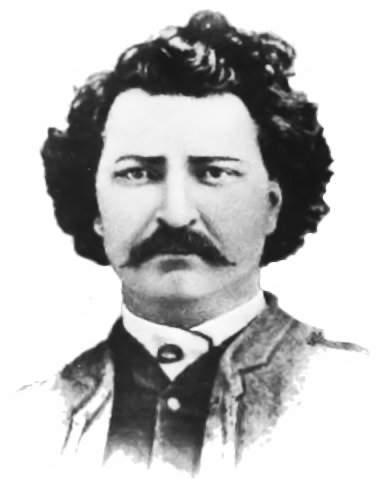
Despite this success, Riel was forced to flee. He lived most of the rest of his life in exile. He returned in 1884, by request of the Métis of the Northwest territories which at the time included Alberta and Saskatchewan. The Métis of the Northwest asked Riel to help them achieve similar recognition of their rights as the Manitoba Métis. Riel helped lead the 1885 Northwest uprising. He surrendered after the Métis were defeated at the battle of Batoche.
Riel was tried and convicted of treason and sentenced to death. He was hanged in Regina, Saskatchewan on November 16th, 1885.
Duke Redbird
https://dukeredbird.ca
Dr. Duke Redbird is an Elder from the Saugeen Ojibway Nation, on the shores of Lake Huron. A Grammy Award winning celebrated Indigenous Visionary as well as an established public intellectual, poet, broadcaster, and filmmaker, Duke is also a highly sought-after keynote speaker. He is an Elder and Advisor to various public and private organizations, and his online presence brings his breadth of cultural knowledge and artistic practice to the benefit of a global audience.
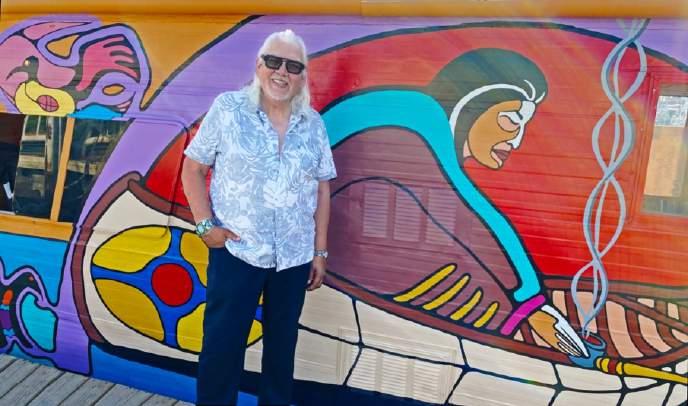
Duke is instrumental in the implementation of innovative multimedia, technologies and beyond, bringing an Indigenous approach to art education that was rooted in his pioneering work at OCAD University. A multidisciplinary artist, he brings an Indigenous lens to modern art and design and has aided in the emergence of a vibrant Indigenous presence on the contemporary cultural scene. Duke’s outstanding contribution to culture, literature, human rights, legacy stretches far beyond his work in Canada.
Duke was inspired by the idea that every country has a national anthem, yet there is no anthem for Our Mother the Earth. He said “if people included an anthem to the Earth along with their national anthem at every event, it would serve to acknowledge our identity, values, and sense of pride in the fact that we are all children of the Earth. We can use our imaginations, innovation, creativity, and capacity to evolve in a cooperative way with nature, in a symbiotic relationship. The definition of love is when another entity's happiness is essential to our own. Right now, the happiness of the Earth is not essential to those industries that are exploiting her resources purely for profit. When we realize that we, as humans, are born fully integrated with the spirit of the Earth… we will replace exploiting with exploring and begin to truly love her.”
With this idea in mind, he wrote the poem Our Mother the Earth.
Our Mother the Earth
Words by Duke Redbird, Music by Sultans of String
Spotify: https://open.spotify.com/track/6hzjNWEBcchIQztCP4lRzd?si=eee2aedbb4f445dd
A Great Mystery, created the universe and manifested a blue geosphere, A radiant planet, the marvelous Earth, the Mother who gave us birth
The genesis of all, we hold dear
With all the billions of stars in space, only the Earth could create The perfect human birthing place
A little sphere of cosmic dust was the spark of spirit given us
In all the years of Her existence
With benevolence and generosity, she provided for our subsistence And never needed our assistance
But now the world is in distress, due to unrestrained excess
Nature reveals that true progress is possessed by every plant and tree That echoes every breath we breathe In a symbiotic symphony of connected sustainability
In the present tsunami of climate change, the Earth may never be the same With 8 billion people and mouths to feed The fires are burning, there's less air to breathe
We must conserve and preserve our rivers and forestry To ensure our own continuity
We must activate, contemplate, and regenerate
The life and abundance of our birthplace
We don't choose where we are born
We are the outcome of a cosmic storm
Our journey is to search and find the natural order of the divine. Joy and enlightenment is the gift this wisdom brings Adore and cherish all living things
Acknowledge the cradle of our precious birth
And our relationship with our Mother, the Sacred Earth.
Kendra Tagoona & Tracy Sarazin
Kendra: https://www.facebook.com/kendra.tagoona
Tracy: https://www.facebook.com/aasivak
SONG: Humma
Traditional Inuit style, arr with Kendra Tagoona, Tracy Sarazin & Sultans of String
Tracy Sarazin and Kendra Tagoona have over twenty years of performing Inuit throat singing, a tradition practiced by Inuit women as a game and a friendly competition. Throat singing mimics sounds from the Arctic environment, such as the river and the wind. It starts with one person making a sound and then the next person repeats this sound immediately after. The leader switches the sound and the rhythm in an attempt to make the follower make a mistake.
Tracy and Kendra enjoy sharing the beauty of Inuit culture with national and international audiences. Friends taught them how to throat sing when they were in their early 20s. They wanted to learn to help revitalize this practice which was almost lost due to colonization practices. Now they perform to promote reconciliation and share Inuit culture.
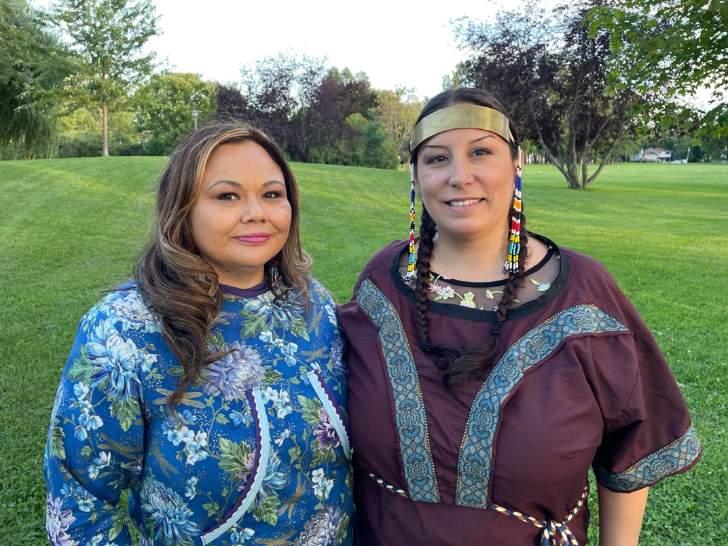
SONG: Quviasuliqpunga
ᖁᕕᐊᓱᓕᖅᐳᖕᒐ (I am Happy)
Trad Inuit, arr by Kendra Tagoona, Tracy Sarazin, Kevin Laliberté, Chris McKhool
This is an Inuit traditional song called a pisiq and written by a man from North Baffin Island. After having a difficult winter with little food, it filled him with joy to look outside to see the first sign that winter was over. This song welcomes the spring and celebrates living.
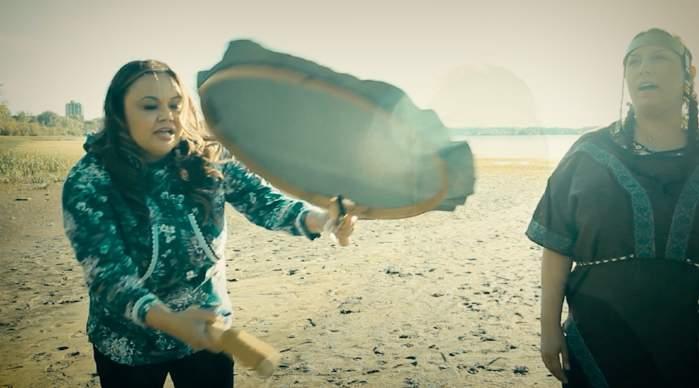
ᖁᕕᐊᓱᓕᖅᐳᖕᒐ ᐃᓅᓂᐊᓕᕋᒪ
Quviasuliqpunga inuunialirama
I am happy, I will be living
ᐅᓪᓗᖅ ᓱᓕ ᑕᐅᕙ
Ulluq suli tauva
Another day is on the rise
ijajajaja aija ijajajaja
ᐊᑯᑦᑐᔫᒃ ᐊᖕᒍᑎᕘᒃ
Akuttujuuk angutivuuk
The stars caught up
ᐅᓪᓗᖅ ᓱᓕ ᑕᐅᕙ
Ulluq suli tauva
Another day is on the rise
ijajajaja aija ijajajaja
In this song, Tracy plays the qilaut (Inuit: "that by means of which the spirits are called up”), a type of frame drum native to the Inuit cultures of the Arctic. The drum is distinctive in that it has a handle and is made of caribou skin, with a low, rumbling sound. It is beaten with a stick, the qatuk. Today synthetic skins are also used.
REF: https://en.wikipedia.org/wiki/Qilaut
ᐊᓕᐊᓇᐃᑦᑐᖃᖅᐳᖅ ᐃᓅᓂᐊᓕᕋᒪ
Alianaittuqaqpuq inuunialirama
There is joy, I will be living
ᐅᓪᓗᖅ
Ulluq suli tauva
Another day is on the rise
ijajajaja aija ijajajaja
Quviasuliqpunga inuunialirama
I am happy, I will be living ᐅᓪᓗᖅ
Ulluq suli tauva
Another day is on the rise
ijajajaja aija ijajajaja
ᓱᓕ ᑕᐅᕙ
ᖁᕕᐊᓱᓕᖅᐳᖕᒐ ᐃᓅᓂᐊᓕᕋᒪ
ᓱᓕ ᑕᐅᕙ
Marc Meriläinen (NADJIWAN)
https://headingnorthmusic.com/nadjiwan 2
The ever-prolific, Toronto-based singer/songwriter, multi-instrumentalist and producer NADJIWAN (aka Marc Meriläinen) has been blending traditional Indigenous culture with contemporary sounds and it has been his trademark since releasing his debut album Brother in 1994.
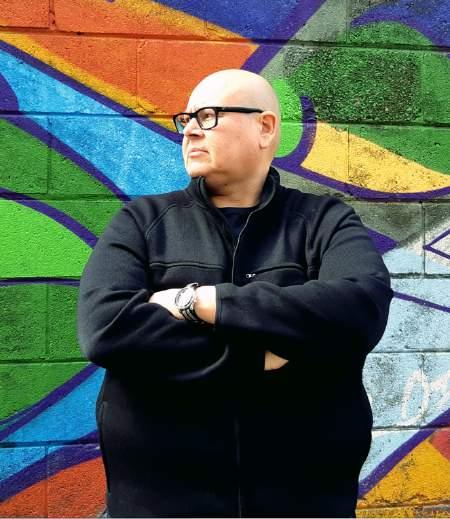
Since then, he has been honoured by the Canadian Aboriginal Music Awards, the Native American Music Awards, the Indigenous Music Awards, and Toronto’s Dora Mavor Moore Awards for the Performing Arts. In addition, NADJIWAN has performed at the 2010 Vancouver Winter Olympics and the 2015 Pan-Am Games in Toronto.
Marc’s roots are deeply entrenched in northern Ontario, as he is a member of the Chippewas of Nawash Unceded First Nation Cape Croker, and has family living on Atikameksheng Anishnawbek, an Ojibway First Nation located on the shores of Whitefish Lake.
Marc latest release, The Great Sea, is arguably his most personal collection of original material to date, inspired by and made in his hometown of Thunder Bay, Ontario. The Great Sea comes on the heels of the acclaimed NADJIWAN release, 2021’s Star Nation, a prog-rock concept album based on Indigenous oral history and mythology. The Great Sea adds another important piece to NADJIWAN’s body of work, which over time has played a vital role in bringing Indigenous voices into the mainstream.
SONG: A Beautiful Darkness
By Marc Meriläinen, arranged with Sultans of String
Spotify:
https://open.spotify.com/track/06Z65ytAIPcSdlU8lgZyEO?si=df02e0aa96da48e2
It’s been a long winter & we’ve kept safe inside But, now is not the time to run & hide
We must come together & we gotta do what’s right We gotta break the darkness & become the light
Shine through the haze & we’ll shine through the days I know we’ll be ok – because love finds a way
From the Great Spirit to the tallest tree
The future was made for all us, yeah you & me When are we going to see that we are all the same It might be a beautiful darkness but we gotta be the flame
Shine through the haze & we’ll shine through the days I know we’ll be ok – because love finds a way
Referencing the title, Marc explains “We were just getting through COVID, and lockdowns, and of course, being in isolation… everyone had that feeling that this was an extra-long winter, because when we started COVID, it was still in the wintertime. And then, sure, we had spring and summer, but those seasons just blew right by, it seems. And we're back in winter again, back into COVID.”
“It seemed like everyone needed this refreshing break from the darkness that has engulfed our lives and forced us into this new way of living that we all had to adapt and adjust. But with each new night, there's always a new day that comes. So the song is about breaking free from these barriers and these things that hold us down… or keep us maybe depressed or not feeling happy.”
Indeed, the chorus lifts the listener out of moody verses. “I always look at it as the chorus being the awakening of spring” Marc continues, “And then the light breaking through the darkness and reinvigorating our lives. And to steal Bruce Cockburn's little quote from that song, ‘Gotta kick at the darkness ‘til it bleeds daylight’.”
Northern Cree
https://northerncree82.com
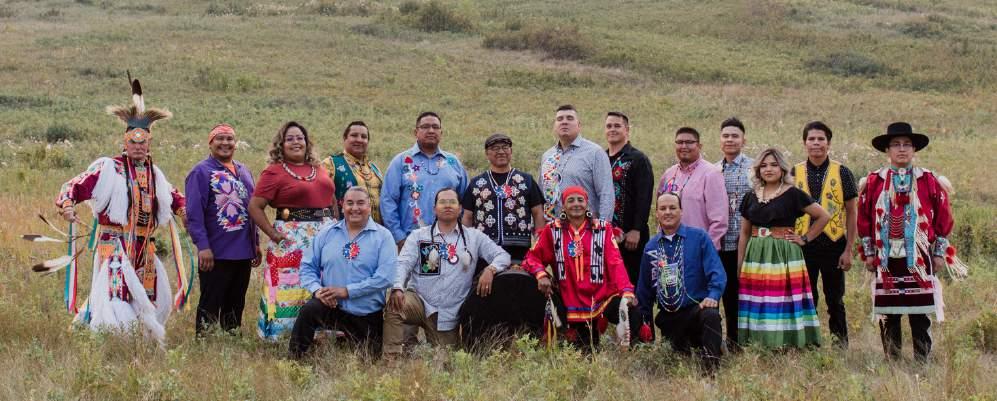
Northern Cree, also known as the Northern Cree Singers, is a powwow and Round Dance drum and singing group, based in Maskwacis, Alberta, Canada. Formed in 1982 by the Wood brothers; Steve, Randy, Charlie and Earl Wood of the Saddle Lake Cree Nation, All members originate from the Treaty 6 and are members of the Cree Nation, unless otherwise noted. (Saddle Lake Band, Samson Band, Louis Bull Band, Frog Lake Band, Onion Lake Band, Sweetgrass Band, Poundmaker Band, Sunchild Band, Menominee Nation)
SONG: Nîmihito (Dance)
Lyrics by music by Leroy Whitstone, Music by Leroy Whitstone & Sultans of String
Spotify:
https://open.spotify.com/track/4Fj9sgqfdIq7d1mm48Y8OR?si=4d5a097a76f04367
Nîmîhito
Nîmîhito
Sâsohkesimow
Sâsipwehôpikek ekwa
Ônimihitowiniwak
Dance
Dance
Dance hard
All start hopping now
Dancers
Steve Wood, Northern Cree drummer and singer, says: “When you're collaborating with mainstream music, it shows that we can work together to bring out the very best in who we are as human beings. And that's what music does. It shows that we can work together and we can bring out something very beautiful. And it's giving our music an opportunity for a different type of audience out there. There's a lot of people that are just catching on to our type of music, which has been here since time immemorial. I think it's great.”
The Cree lyrics, written by Leroy Woodstone, talk to the dancer about dancing and dancing hard and feeling the beat of the drum, encouraging the dancer to get down.
But there’s also an educational role in the song, says Steve: “A big, strong component of it is to teach our people and other First Nations people about the Cree language. It's the very tip of who we are and of our ceremonies, pow wow is. It brings other people into our circle.”
Studio sessions were spread across two provinces, with Northern Cree parts recorded at StudioBell at The National Music Centre in Calgary, produced by The Halluci Nation (Bear Witness, 2oolman) with recording Engineer Graham Lessard. Sultans of String tracks were recorded at Jukasa Studios, an Indigenousowned world-class recording facility on the Six Nations reserve south of Hamilton Ontario, with Sultans band members Chris McKhool and Kevin Laliberté coproducing along with Grammy and JUNO winning John ‘Beetle’ Bailey.
The two groups met at Kettle and Stony Point’s Annual Pow Wow in the summer of ’22, where Steve shared that “The drum is also a very spiritual tool because when you look at the drum, somebody's grandparent, mother, father, child gave its life for that head of the drum, because that was an animal, and is very much alive. Now, the rim is made from the tree. And we really look deep, the tree can teach us a lot because they're alive. They can teach us about the relationships we have with everything around us and everyone else. And that person, those people that came to put that drum together, they had spirits, too. And they put their own spirit in the drum. And that's where all the energy comes from.”
Shannon Thunderbird
https://www.shannonthunderbird.com
Shannon Thundrbird, M.A., B.A. (Hons.), is a Ts’msyen Elder originally from the Pacific northwest coast of British Columbia: Gilut'sau Band of the Royal House of Niis'gumiik, Gispudwada (Orca) Clan.

She is an international speaker, singer-songwriter, recording artist, painter, and writer. Her fireside chats, lectures, and original music open the minds and hearts of audiences to the rich culture and history of Canada's Indigenous people. She is the founder and artistic director of Teya Peya Productions, and lead vocalist with her trio, Amgan Łiklgaawks (Red Cedar Sisters). She performs with Sultans of String, and choirs across the country.
SONG: Black Winged Raven
By Shannon Thunderbird, arr by Sultans of String
Hey ya ya ya, hey yah ya ya Hey ya hey ya hey-oh hey-oh
Hey ya ya ya, Hey ya ya ya Hey ya
hey ya hey-oh hey-oh
Gaaxsm, Gaaksm hey hey-oh
Giya lipaayga haayk
Giya lipaayga haayk
Giya lipaayga haayk hey hey-oh
Hey yah yah yah…
T’u’u’tsk gak’ay, T’u’u’tsk gak’ay
T’u’u’tsk gak’ay hey hey-oh
Giya lipaayga haayk
Giya lipaayga haayk
Giya lipaayga haayk hey hey-oh
Hey yah yah yah…
Black Winged Raven is in the language Sm'algyax and speaks about Raven, the Culture Hero of the Pacific Northwest Indigenous People. He helped organize the natural world and taught humans many things. He is funny, wise, and a champion problem solver.
SONG: Lost and Found (High school only)
By Shannon Thunderbird, arr by Sultans of String
The wind raced through the trees, dying children on their knees
Where have you gone, I love you, please come home to me.
And a small voice whispered
It’s okay now, you found us, you found us
Thousands of children’s bones in the ground
Deep reaching pain for so many
Lost to the ravages of evil
Cries unheard for years and years
And a small voice whispered
It’s okay now, you found us, you found us
Apologies won’t save the day
Death of babies far outweigh
Pale words that came a hundred years
Far too late
And a small voice whispered
It’s okay now, you found us, you found us
Wey-oh, wey-oh, wey-oh, wey-oh, wey- oh hey oh ha
Hidden away and waiting.
Wey-oh, wey-oh, wey-oh, wey-oh, wey- oh hey oh ha
Long time gone.
Wey-oh, wey-oh, wey-oh, wey-oh, wey-oh hey oh ha
Aching to come back home
Wey-oh, wey-oh, wey-oh, wey-oh, wey-oh hey oh ha
Rising from the pain
Da Ts’uusk amhaw k'amts'n haws
And a small voice whispered
And a small voice whispered
It’s okay now
You found us
K'am 'waask dp niit
You found us
The song “Lost and Found” is devastatingly honest and confronts the listener with the truth of the residential school system. On May 27, 2021, the bones of 215 Indigenous children were found on the property of a former residential school in Kamloops, B.C. The deadliest years were from the 1870s to the 1930s.
"I wrote the song on June the 11th. By this time, the news had gone across Canada about the finding of the bones of our children from residential school horrors” says Shannon, “and the first ones were the 215 from a residential school in Kamloops BC. Since then, it's a little over 10,000 now have been found … I was in a lot of tears thinking about my grandmother, thinking about my mother, thinking about what happened to me. All of these things that came out of this horror"
The deadly reputations of residential schools were well known to officials at the time but no action was ever taken. One survivor told the Truth and Reconciliation Commission, “I just remember they were here one day and they were gone the next.”
Says Shannon: “The song laments the deaths of these precious souls and is also a tangible reminder of Canada’s terrible history when it came to the treatment of Indigenous people.”
 Pictured below, Shannon Thunderbird and sister Kate Dickson
Pictured below, Shannon Thunderbird and sister Kate Dickson
SULTANS OF STRING
https://sultansofstring.com
Spotify: https://tinyurl.com/sos-spotify
3x JUNO nominees and SiriusXM winners Sultans of String create “Energetic and exciting music from a band with talent to burn!” (Maverick Magazine UK). Thrilling their audiences with their genre-hopping passport of Celtic reels, flamenco, Django-jazz, Arabic, Cuban, and South Asian rhythms, Sultans of String celebrate musical fusion and human creativity with warmth and virtuosity. Fiery violin dances with rumba-flamenco guitar, while bass and percussion lay down unstoppable grooves. Acoustic strings meet with electronic wizardry to create layers and depth of sound, while world rhythms excite audiences to their feet with the irresistible need to dance.
Since releasing their debut album Luna in 2007, Sultans of String have continually strived to make each chart-topping album more original and meaningful than the last. That includes working with an orchestra (2013's Symphony), teaming with Pakistani sitarist Anwar Khurshid (2015's Subcontinental Drift) and even crafting a world-music holiday album (2017's Christmas Caravan), which landed them on the Billboard charts and the New York Times.
Their ambition and work ethic have garnered them multiple awards and accolades, including three JUNO nominations, first place in the International Songwriting Competition (out of 15,000 entries), six Canadian Folk Music Awards and countless other honours, plus a Queen’s Diamond Jubilee medal (for bandleader Chris McKhool). Their 2020 release Refuge garnered awards including 2 Independent Music Awards for Instrumental Song of the Year and World Music Producer of the Year, as well as 2021 CFMA for Producer of the Year for Chris McKhool and John Bailey. The lead track from their followup

Sanctuary was part of John Bailey's 2022 Engineering JUNO nomination. Their recent Refuge film just won Best Musical Film at the Cannes World Film Festival.
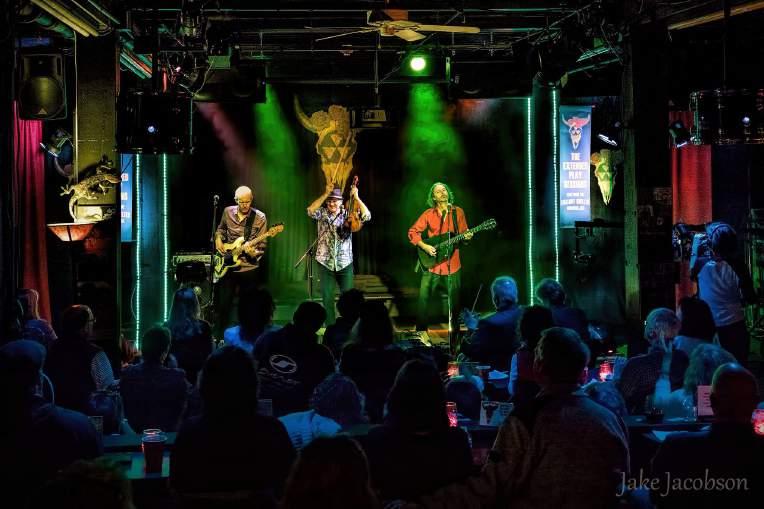
McKhool has an Egyptian-born mother who happened to play piano, teach classical theory, and feed her young son as much Middle Eastern cuisine as she did music lessons. From there, the powerful violinist developed a taste for multigenre string sounds and found a like-minded crew of all-world enthusiasts. When McKhool first heard founding guitarist Kevin Laliberté’s rumba rhythm, their musical synergy created Sultans of String’s signature sound – the intimate and playful relationship between violin and guitar. From this rich foundation, the dynamic duo grew, featuring such amazing musical friends as in-thepocket bass master Drew Birston, and the jaw-dropping beats of percussionist Chendy Leon.
Their live resume is similarly stellar. Equally at home in a concert hall, folk and jazz club or festival setting, the Sultans have gigged at JUNOfest, the legendary club Birdland in New York, Celtic Connections Festival (Glasgow) and London’s Trafalgar Square. They have sold out Koerner Hall three times (Toronto’s Carnegie Hall), and performed with the Annapolis, Toronto, Vancouver, Edmonton Symphony Orchestras. They have played live on CBC’s Canada Live, BBC Radio, BBC TV, Irish National Radio, and the syndicated World Café, Woodsongs, and SiriusXM in Washington. Sultans of String’s musicianship and versatility are also showcased in collaborations with such diverse luminaries as Paddy Moloney & The Chieftains, Sweet Honey in The Rock, Richard Bona (Paul Simon), Alex Cuba, Ruben Blades, Yasmin Levy, Benoit Bourque, Béla Fleck, Crystal Shawanda & Ken Whiteley.
Chris McKhool – violin
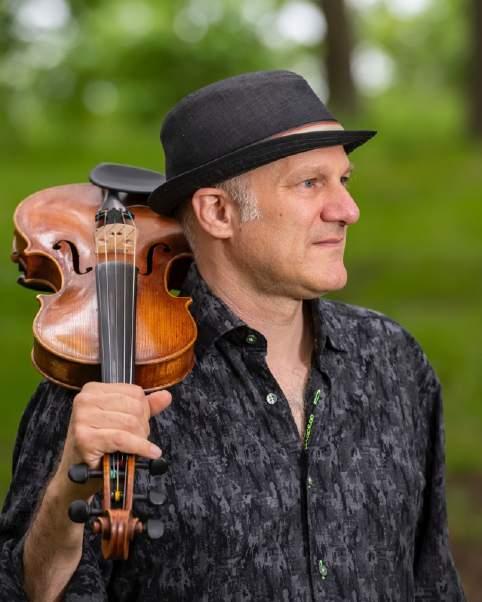
https://www.facebook.com/mckhool
A Queen’s Diamond Jubilee medal recipient for his work creating community through music, bandleader Chris McKhool’s “lush, lyrical” violin playing is inventive and rich. Chris produces, composes and plays violin with Billboard charting Sultans of String, who’s CDs hit #1 across Canada in the Top Ten International/World community radio charts, and earned 3 JUNO Award Nominations for Instrumental and World Album of the Year. He has also won the SiriusXM World Music Award and six Canadian Folk Music Awards out of eleven nominations.
Chris grew up in a house bursting with music and diversity. His paternal Makhoul grandparents immigrated to Canada from Lebanon in the early 1900’s. His Egyptian-born mother is a piano and theory teacher. Growing up Chris was fed a steady diet of delicious musicality along with Middle Eastern cuisine and violin lessons. From a very young age Chris was taught the Canadian values of tolerance, respect for all peoples and celebration of culture. His passion for exploring rhythms and melodies has led him far and wide, collecting instruments and styles from around the world.
Since then Chris has recorded and performed with several jazz, world, folk and pop artists including Béla Fleck, Jesse Cook, the Chieftains, Pavlo, Amanda Martinez, Richard Bona, Ruben Blades, Yasmin Levy, and Nikki Yanofsky. As producer he received a nomination for Producer of the Year for the 2018 CFMAs, and won Producer of the Year for the 2020 Independent Music Awards and 2023 CFMAs. He won the inaugural PIVOT AWARD from CIMA for creating the Sultans Zoom Room series, as well as the Cannes World Film Festival Award, producing a documentary called Sultans of String: The Refuge Project, based on their albums Refuge and Sanctuary.
Kevin Laliberté - guitar
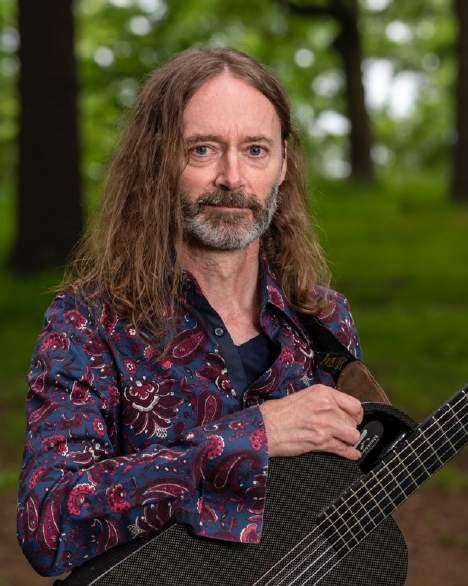
http://www.kevinlaliberte.com
Kevin’s original compositions from his hit CDs One, Sundance, Siesta and Elation have been featured on many TV shows. They can also be heard nation-wide on radio and satellite music services. They represent a meeting of many aspects of Kevin’s experience as a guitarist melding flamenco rhythms, a jazz improvisational approach, and a pop melodic sensibility.
Kevin grew up in an environment filled with music. Many family members played an instrument or two, and family gatherings often included some kind of impromptu jam session. His mother played accordion and taught at the Ontario Conservatory.
Kevin’s music training began at the age of 8, when he took lessons on the banjoukulele with local music teacher who fostered his love of music at an early age by stressing fun and expression, rather than technique and memorization. A year later, he began playing the tenor banjo when his grandfather Denis Laliberté, a self-taught musician who appeared on radio broadcasts in the Windsor, Ontario area in the 1930’s and 1940’s, gave him his vintage S.S. Stewart Wondertone tenor banjo. The banjo eventually led him to the guitar, and soon his grandmother Idella Andrews bought him his first electric guitar.
Like many Canadian teenagers in the 1980’s, Kevin played guitar in various high school rock bands, and continued his musical studies. A chance purchase of a Pat Metheny record opened his ears to the sound of jazz, and set a new direction for Kevin’s musical pursuits.
In addition to performing his own works, Kevin has toured around the globe with international artists Jesse Cook, the Chieftains, Sultans of String, performed on the Tonight Show with Charlotte Church, and in Beijing with Chinese recording artist Dadawa.
Drew Birston - bass

https://drewbirston.com
Drew Birston is a versatile bassist and singer/songwriter living in Toronto, Canada. He is a one-of-a- kind player, with a rare gift for groove, swing, lines and melody. He has been active on the Jazz and Pop scene recording, performing and touring with a wide variety of artists for 20 years on well over a hundred sessions with a wide variety of artists in folk, jazz, songwriter and pop genres.
Music was in the cards for Drew growing up in Winnipeg, MB. The youngest of five siblings, he was surrounded by a wealth of sounds ranging from his father’s stride piano to his brother’s love of Beethoven to Carol King. With an interest in singing, he started off performing in school choirs eventually moving onto the clarinet in band class. Switching over to double reeds, he pursued the oboe and later studied the bassoon at university level.
Meanwhile, during visits to his aunt and uncles farm near Cloverdale, MB, he would borrow their Epiphone guitar and spend many hours in the basement playing along with records and learning Beatles, Stevie Wonder and Bruce Coburn songs. After trying his older brother’s Hofner bass guitar, he developed a love for electric and upright bass and pursued that through high school and into university.
After completing jazz studies in Antigonish, NS and Montréal, QC, the Toronto music scene was calling and he started performing with Lava Hay, The Leslie Spit Treeo, The Wild Strawberries, Melanie Doane, Chantal Kreviazuk, Justin Hines, Tomi Swick, Lily Frost and Moon V Sun. He has also had the great fortune to work with producers such as Brent Bodrug, Justin Abedin, Ron Lopata, Danny Leblanc, George Seara and Stephan Moccio and has appeared on over a hundred recordings including nine with Sultans of String.














 Pictured below, Shannon Thunderbird and sister Kate Dickson
Pictured below, Shannon Thunderbird and sister Kate Dickson




